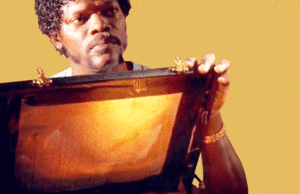I’ve run across a pattern here in Goldberg’s book, or at least a pattern for me, one that resonates in me: owning whatever we want in our writing, and then freeing it (31). She expands on this in her chapter “We Are Not the Poem” in ways that ultimately don’t work for me (she applies the discussion to gaining too much recognition for a particular type of writing, and reading that work too often in public – problems I don’t have, and don’t ever anticipate having, to be honest), but where it does work for me is earlier, in her establishing, clarifying discussion of the issue: “the problem is we think we exist” (34). We think that our words, once we get them down on paper/bits & bytes/whatever, that they are frozen and permanent. This isn’t the case, at all, and as writers we need to remember this (or learn it).
For instance, my first class as an undergraduate was a literature class, and it was one of the really, really basic ones – a good way to start, honestly, and as it dealt with such an array of writers (Langston Hughes and Shakespeare both were represented) it must have been a survey class. Amazing the things that stick in the brain, isn’t it? Anyway, in this class, we discussed “Battle Royal” (a part of the novel, “The Invisible Man”) and much as I would later be frustrated by wondering what exactly was in the briefcase in Pulp Fiction, I was frustrated mightily by the discussion of the briefcase Ellison’s protagonist receives.
The instructor was a graduate student, working on his thesis (I was SO IMPRESSED by this, that he would just so blithely toss this out, like it was nothing), and I always referred to him has “Mister,” even though he was miles younger than I was at the time. This didn’t feel strange in the least. But I asked him what the meaning for the briefcase was, pointing to a specific line describing the case, wanting more, and specifically wanting the “more” to be an absolute. He responded, “What do YOU think it means?”
This was not helpful to me at all, at the time, I thought. I understood in general terms that the meaning of the briefcase was mutable, and that the instructor wanted me to apply my own critical thinking skills to the reading and my new knowledge about Ralph Ellison and Ellison’s purposes in writing and come to some greater understanding of the briefcase as more than just a leather satchel. Yes, yes, yes, all fine and dandy, good, great, stellar. But what does it MEAN???
You would think that as a child I skipped to the end of a book and read the ending first, but I never did.
The words Ellison wrote in “Battle Royal” that confounded me so much were full of intention, purpose, and meaning, but they weren’t concrete at all. They changed, depending on who was reading them and what personal experiences the reader brought to the reading. That wasn’t what was important, though, and that’s not what is important in my writing either. What’s important is Goldberg’s description of the freeing nature of writing, and “that moment you can finally align how you feel inside with the words you write” (34). That moment is what was important for Ellison, I bet. His book, “Invisible Man,” is full of terrible metaphors for how life was for brown folks in his day, and what life was like as a young man trying to make his way in a horribly racist world. I bet there was some power for him in laying all those words down, describing how it was, but not making it so explicit that people were locked in to one reading. Goldberg says that that moment is key, because once you mesh your words and your feelings, “ “you are free because you are not fighting those things inside. You have accepted them, become one with them” (34). I don’t want to put words in Ellison’s mouth, or his pen, but I do like to imagine that even if he couldn’t be free from the situations that lead to his writing “Invisible Man,” he could at least feel some momentary power just through the articulation.
Goldberg says that there is no permanent truth that can be captured and held in a poem, and I believe her. We, as readers, change all the time, and she, as author, changes along with us, just like we do. The words stay the same, but the meanings they bring with them are constantly changing and shifting. I guess my question becomes whether or not that makes me more or less intimidated by the act of sitting to write?
